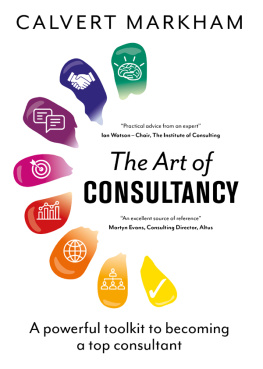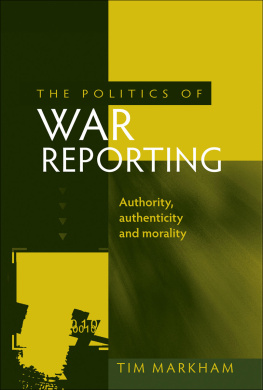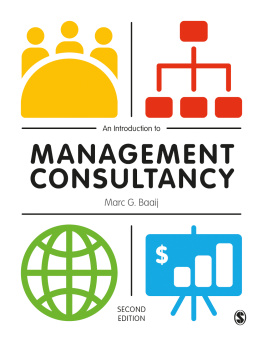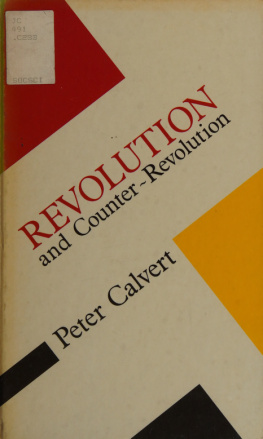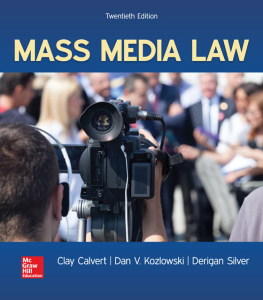Calvert Markham - The Art of Consultancy
Here you can read online Calvert Markham - The Art of Consultancy full text of the book (entire story) in english for free. Download pdf and epub, get meaning, cover and reviews about this ebook. publisher: Legend Press, genre: Romance novel. Description of the work, (preface) as well as reviews are available. Best literature library LitArk.com created for fans of good reading and offers a wide selection of genres:
Romance novel
Science fiction
Adventure
Detective
Science
History
Home and family
Prose
Art
Politics
Computer
Non-fiction
Religion
Business
Children
Humor
Choose a favorite category and find really read worthwhile books. Enjoy immersion in the world of imagination, feel the emotions of the characters or learn something new for yourself, make an fascinating discovery.
- Book:The Art of Consultancy
- Author:
- Publisher:Legend Press
- Genre:
- Rating:5 / 5
- Favourites:Add to favourites
- Your mark:
- 100
- 1
- 2
- 3
- 4
- 5
The Art of Consultancy: summary, description and annotation
We offer to read an annotation, description, summary or preface (depends on what the author of the book "The Art of Consultancy" wrote himself). If you haven't found the necessary information about the book — write in the comments, we will try to find it.
The Art of Consultancy — read online for free the complete book (whole text) full work
Below is the text of the book, divided by pages. System saving the place of the last page read, allows you to conveniently read the book "The Art of Consultancy" online for free, without having to search again every time where you left off. Put a bookmark, and you can go to the page where you finished reading at any time.
Font size:
Interval:
Bookmark:

This is the practical approach I wish I had come across much earlier in my career. Calvert provides a strong guiding framework for delivering consultancy projects from beginning to end. His writing makes consulting easily accessible for anyone who wishes to deliver their particular expertise into a client organisation.
Cynthia Pexton-Shaw, Elevation Learning
A book that gets to multiple editions is clearly a classic of its sector. Calverts is in its seventh, and will probably go on to many more. It achieves a threefold feat: of being useful to the expert and to the recently qualified and to the student. Even those of us who have spent decades in this profession need a consultancy bible to refer to. Calvert shows how to be rigorous and systematic, but the book is packed with practical advice from one who is both an academic expert and a senior practising consultant. This is both The Art and The Science of Consultancy.
Ian Watson Chair, The Institute of Consulting
This book explains in plain English the role and daily challenges of life as a management consultant, and has been an excellent source of reference in building our business. Calvert presents a practitioners view covering the requisite soft skills as well as the mechanics of solving the clients business problems.
Martyn Evans, Consulting Director, Altus
In a world of disruption and the supremacy of technological advancement, Calvert reiterates the leading role of the human component, where professionalism and ethical behaviour rule. The communication, presentation and influencing skills backed by strong knowledge will remain key attributes in a profession which must reinvent itself more often than others.
Sorin Caian, Immediate Past Chairman of ICMCI / International Council of Management Consulting Institutes

Legend Business Ltd,
107-111 Fleet Street, London, EC4A 2AB
Contents Calvert Markham 2019
The right of the above author to be identified as the author of this work has been asserted in accordance with the Copyright, Designs and Patents Act 1988.
British Library Cataloguing in Publication Data available.
Print ISBN 9781789550818
Ebook ISBN 9781789550825
Set in Times. Printing managed by Jellyfish Solutions Ltd
Cover design by Simon Levy | www.simonlevyassociates.co.uk
Publishers Note
Every possible effort has been made to ensure that the information contained in this book is accurate at the time of going to press, and the publisher and author cannot accept responsibility for any errors or omissions, however caused. No responsibility for loss or damage occasioned to any person acting, or refraining from action, as a result of the material in this publication can be accepted by the editor, the publisher or any of the authors.
All rights reserved. No part of this publication may be reproduced, stored in or introduced into a retrieval system, or transmitted, in any form, or by any means electronic, mechanical, photocopying, recording or otherwise, without the prior permission of the publisher. Any person who commits any unauthorised act in relation to this publication may be liable to criminal prosecution and civil claims for damages.
There is perhaps, a paradox in an industry that thrives on and promotes change, and yet has enduring features such as the skills of change management and relationship building. In fact, this is unsurprising because change is always a question of perspective. Or rather, continuity is always close by, even if it is often less celebrated, visible or feared.
Such a tension is especially evident today when the consulting industry seems to be transforming, both in terms of its structure and its fields of activity. We are now constantly told how the industry, and the big firms especially, face disruption from many sources, notably the gig economy, regulation and globalisation. My own research too points to the fact that consulting has become so successful in many contexts that it is now part of the management mainstream, making it less distinctive. Likewise, in a recent survey seeking to identify the consulting skills of 2030, emerging areas of expertise are highlighted such as cyber security, artificial intelligence, big data and robotics. But there will always be new knowledge and without this, consultancy would indeed die out. Also, even if the large firms have had their heyday, consulting skills will be needed by those inside and outside the industry, whatever label is given to them.
This book epitomises that which is enduring and widespread in consultancy whilst simultaneously being of the moment. It is in its seventh edition now and is fundamentally practical. For an academic, like me, it has far too few references in it! But this is because it is both tried and tested in practice of both consulting and training consultants. It is aimed at those who wish to do consultancy not explain it, although it is also informed by various models. Finally, its lineage also means that it is distilled down to the essences of consulting comprehensive, succinct and efficient (and so ideal for those with little time) whether as a sole practitioner, part of a network or an old fashioned employee!
Of course, in highlighting the continuities of consulting its art there is a risk of leaving the new and difficult in the shadows, but actually, they work together in the consulting cycle of relationships, projects and, hopefully collaboration.
Andrew Sturdy
Professor of Management and Organisation, University of Bristol, UK and management consultancy researcher and writer.
Consultancy is delivering specialist skills in a client environment. The critical word in this definition is client, implying a relationship in which an outsider makes their knowledge and experience available to an organisation. But clients (however defined) have a choice about whether to engage a specialist, and whether to take that specialists advice. Incompetent consultants will quickly lose their clients.
There are skills involved in being a competent consultant more than simply being a subject matter expert and its these that this book seeks to cover.
Consultancy is a buoyant and expanding sector. More and more people are entering the profession and all need consulting skills. Much of my career has been spent in training consultancy skills and in this book I hope I have been able to capture the key areas that are going to be of value to someone taking up the profession of management consultant.
However, as many routine tasks have been automated away, managers are also expected to seek performance improvements through change. They too must engage in projects and influence rather than command the same skills as a consultant so the study of consultancy and the skills needed are now a common feature of postgraduate business courses. And an understanding of consulting is of value to executives who need to hire and work with consultants.
Consultancy services are now offered by a much wider range of organisations and in recent years there has been the growth of emergent consultancies organisations whose main business is not consultancy, but who now offer their know-how to outsiders, either simply to generate revenue or to make their primary product lines more competitive.
Font size:
Interval:
Bookmark:
Similar books «The Art of Consultancy»
Look at similar books to The Art of Consultancy. We have selected literature similar in name and meaning in the hope of providing readers with more options to find new, interesting, not yet read works.
Discussion, reviews of the book The Art of Consultancy and just readers' own opinions. Leave your comments, write what you think about the work, its meaning or the main characters. Specify what exactly you liked and what you didn't like, and why you think so.

